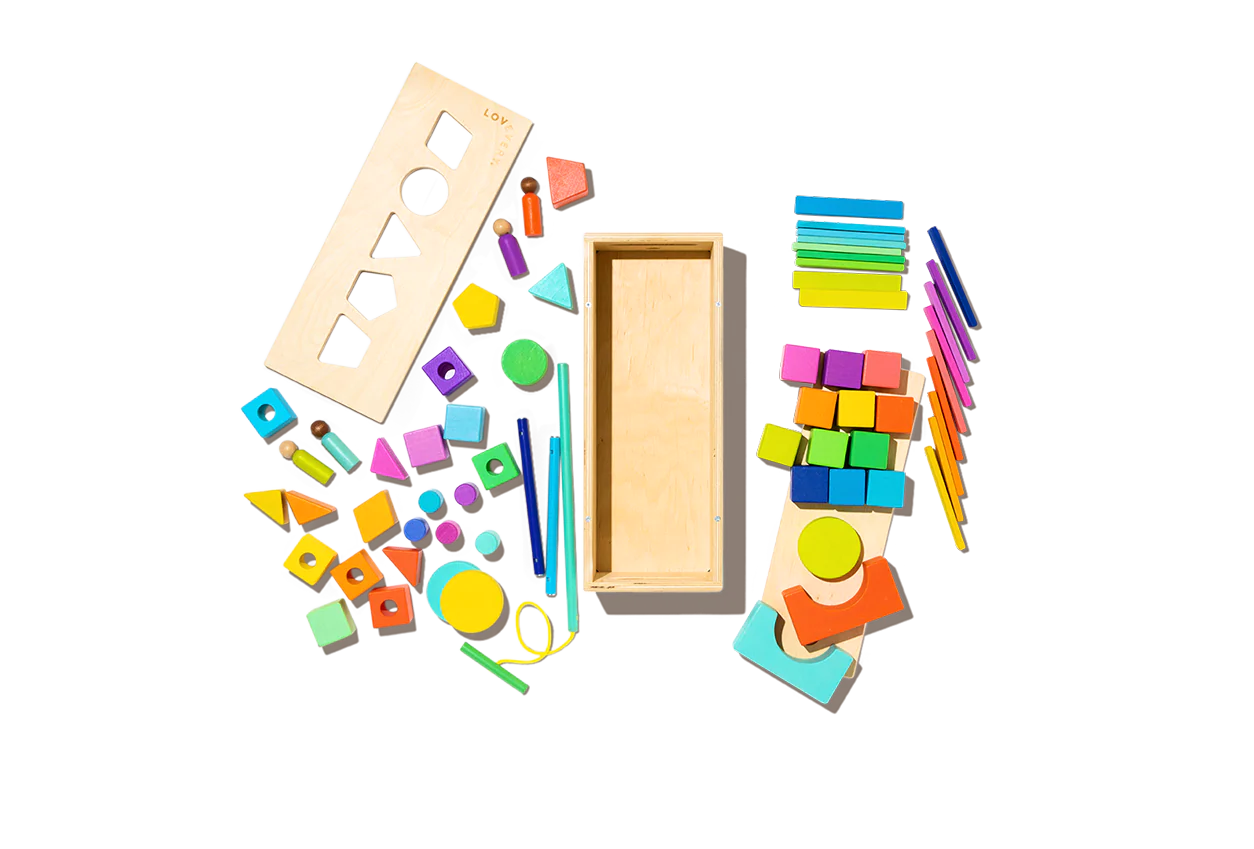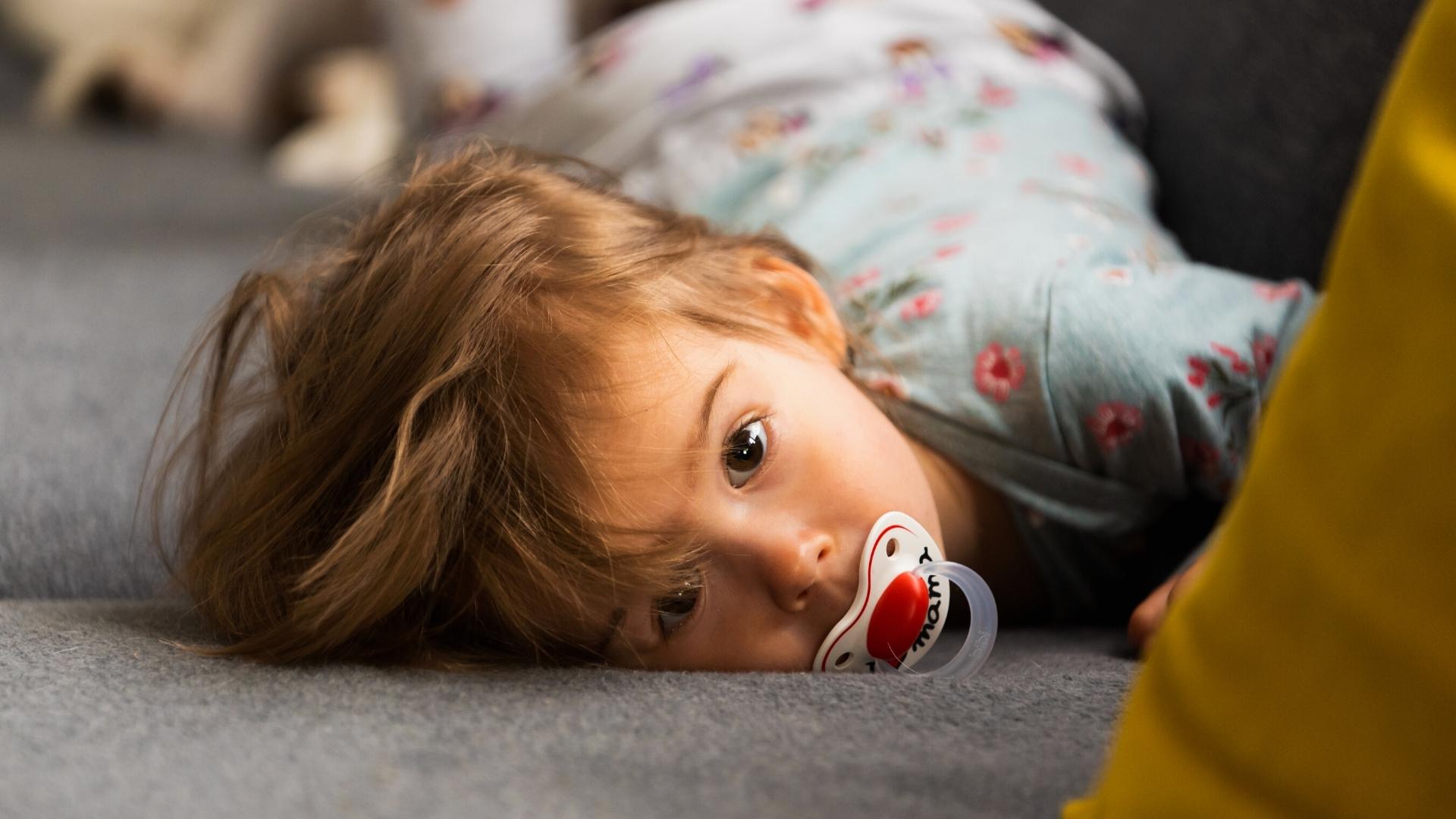Baby suddenly fighting sleep? Being fussy? Struggling to settle? The 14 month sleep regression has arrived. Here’s what that means, and what exhausted parents need to know to get through it.
What Is The 14 Month Sleep Regression?
The 14 month sleep regression is a short period of time in which your baby’s sleep pattern becomes disrupted by them fighting sleep, having more night wakings and struggling to fall back to sleep, usually as a result of environmental changes and developmental leaps.
How Long Does The 14 Month Sleep Regression Last?
The 14 month sleep regression, like all sleep regressions, commonly lasts between 2 and 6 weeks depending on the trigger.
How Much Sleep Do 14 Month Olds Need?
At 14 months of age, most babies will need an average of 12-14 hours sleep a day with the bulk taken at night and the rest in 2 daytime naps.
However, not all 14-month-olds will need 2 naps per day and some may only take one long nap.
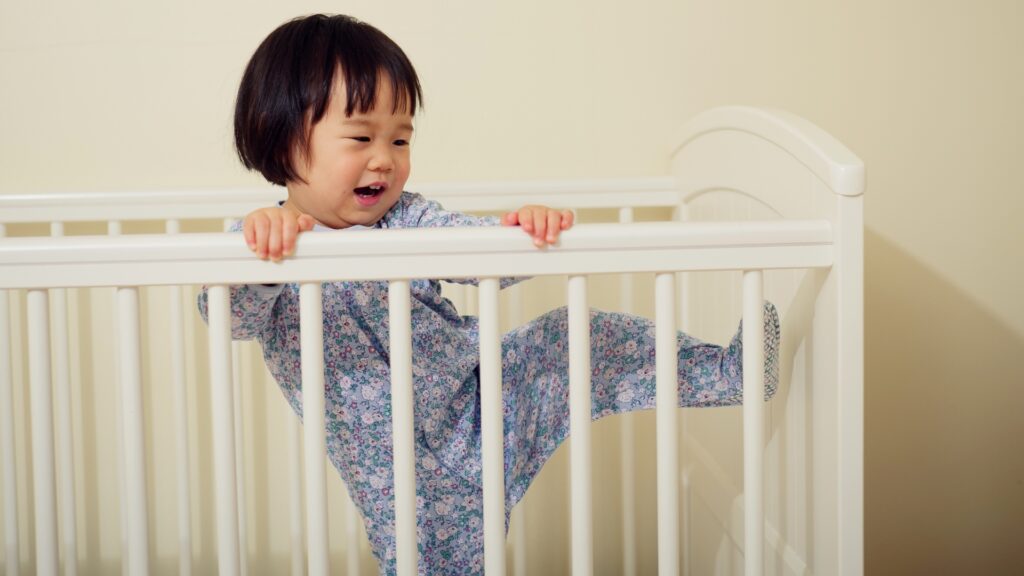
14 Month Sleep Regression Signs
If your little one has been settling and sleeping well until now, the signs that your baby is experiencing a sleep regression are:
- They have difficulty falling asleep. If your 14 month old has been falling asleep nicely and then starts to regress to resisting sleep and struggling to settle then it is very likely they have hit a sleep regression.
- They are fighting nap times. While most toddlers continue to need 2 naps a day until their 2nd birthday… some may drop to 1 nap a day at an earlier age. If this is the case, it is still important to have quiet time after lunch to engage in a quiet activity or two, to substitute for the second nap.
- Your child is crying more and becoming agitated when they wake. Because a sleep regression results in less deep refreshing sleep, your little one may wake in a grumpy mood and be rather fussy and unsettled.
- They wake more often at night and struggle to get back to sleep. As with finding it more difficult to fall asleep, it is typical during a sleep regression for your little one to wake more often at night. This may also affect how long they stay asleep during the day.
- They are learning new skills. If your baby is starting to walk, and climb they will be stimulating their brain and body to the point that they find it difficult to unwind at naptime and bedtime. They will also be starting to talk at this stage and may well practice when they should be sleeping.
- Your little one is increasingly interested in their surroundings. The world is a wondrous place and as with learning a new skill, developing an interest in their surroundings means your little one’s brain is being very stimulated and may struggle to wind down for sleep.
- Your baby fights sleep despite being tired. During a sleep regression, it is easy for your little one to become overtired and this can result in them fighting sleep. In addition, when learning new skills the extra stimulation can make it difficult for them to turn off and wind down in order to sleep.
- They are more clingy. Separation anxiety can kick in at any age. And it can be exaggerated during a toddler sleep regression. This can result in them being more clingy and not liking being left alone… especially when it is time to sleep.
Looking to get your little one to sleep quickly and effortlessly? Check out my Bedtime and Nap Cheat Sheet and master the art of making daytime naps and bedtimes as seamless as possible.
A bedtime & nap cheat sheet so good your little one will ask you to put them to bed...
Laura Williams "This is a life saver! I'm so glad I downloaded your bedtime & nap cheat sheet. My little one actually asked me to put him to bed last night! Unbelievable! Thank you so much!"
Click Here For The FREE Cheat Sheet
Causes Of The 14 Month Sleep Regression
As I mentioned earlier, sleep regressions can be caused by a variety of reasons, the main ones being environmental changes and developmental leaps…
However, there are other reasons why a 14 month sleep regression can occur and it’s important to know what they are to reduce the chances of a sleep regression from occurring and to navigate through one:
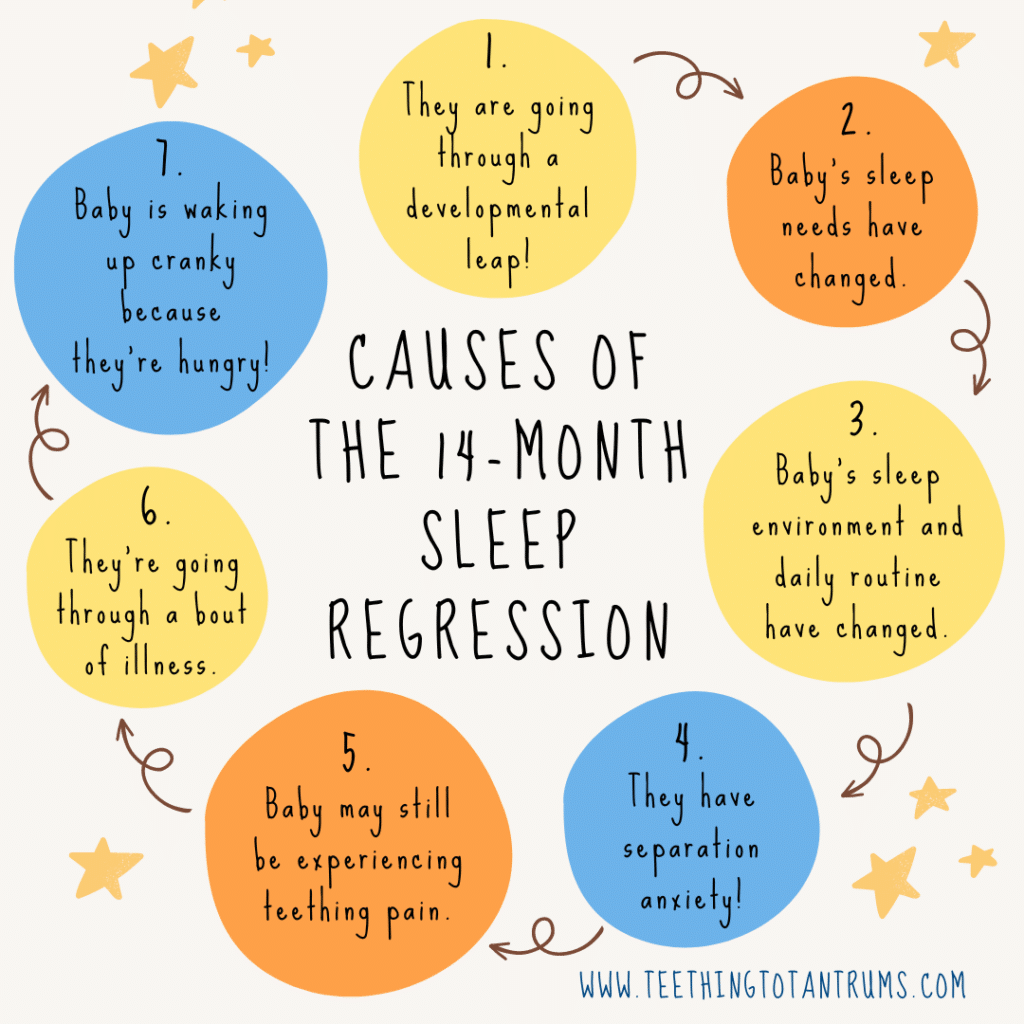
1. They Are Reaching Big Physical, Mental And Emotional Milestones
This is an age of rapid growth with your little one perfecting the art of walking, climbing and talking. There is also a lot going on cognitively as they become increasingly aware of the world around them and their place in it.
All that extra brain and body activity can easily disrupt their sleep cycles!
2. Their Sleep Needs Are Changing
Around this age, you may need to adjust daytime sleep, especially if newfound skills are making them more tired.
If baby has started daycare, they may need more sleep for a while as they adjust to the new routine. Alternatively, some 14 month olds will be going through a nap transition and may only need 1 long nap during the day.
3. Baby’s Environment And Routine Has Changed
Moving house, going on holiday or visiting family overnight can all trigger a sleep regression.
And any major changes in routine could also upset an established sleep schedule such as starting daycare, parents returning to work or the primary caregiver changing.
4. They’re Experiencing Separation Anxiety
Separation anxiety is also very common at this age and will make it difficult for your little one to fall asleep and they may become distressed when they wake up in the night and discover you’re not with them.
5. They’re Teething
While most babies will have passed the teething phase by now… some will still be getting theirs.
If your little one is experiencing pain due to teething, their sleep is very likely to be disrupted for a short while triggering a temporary sleep regression.
Investing in quality teething toys can help soothe your baby resulting in them sleeping better!
6. Baby Is Unwell
Like teething, illness may cause a sleep disruption for a short period of time and although this is not a true sleep regression, sickness can trigger a brief one.
7. They’re Hungry
With all the increased physical activity that your 14 month old is now capable of they may need more calories to keep them going. This can result in them waking more often due to hunger so you need to keep an eye on their calorie intake during the day (especially at the end of the day).
Tips To Get Through The 14 Month Sleep Regression
If your little one does start to experience sleep troubles around 14 months of age, then there are some things you can do to help both you and your baby get through this sleep regression:
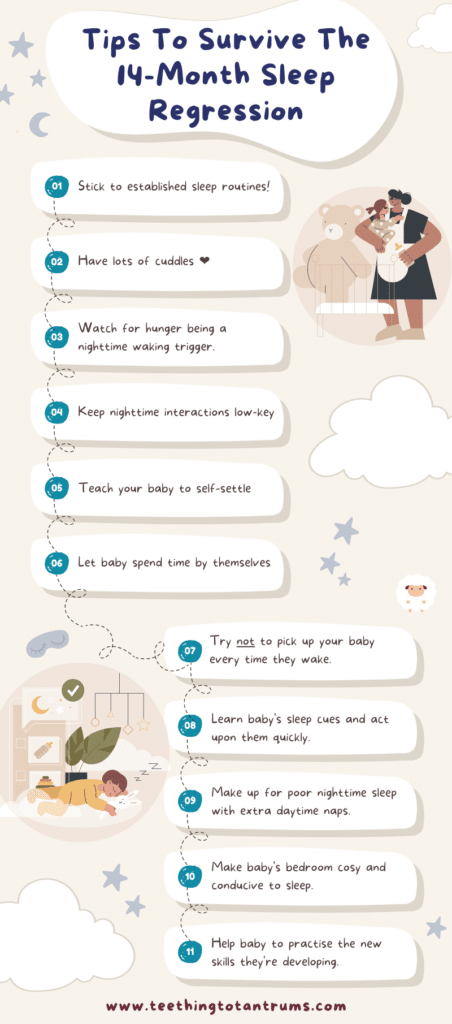
1. Stick To Your Established Routines
I cannot stress how much maintaining baby’s healthy daily and consistent bedtime routines will help to keep you sane and keep their healthy development on track.
I know life gets in the way sometimes, but being super vigilant about nap times, meal times and bedtimes during a sleep regression will make your life so much easier during this time.
So, if you have to cancel a few plans over the coming weeks to ensure you’re at home for naps and bedtime, it will be worth it in the long run.
TOP TIP: Ensuring your baby gets consistent cues from you in preparation for sleep will go a long way in helping your little one fall asleep during a sleep regression. And a regular bedtime and nap routine will do just that.
2. Have Lots Of Cuddles
Sleep regressions can sometimes make your little one feel less secure and offering extra cuddles and snuggle time can help reassure them as they navigate this tricky, yet temporary phase.
3. Watch For Hunger Being A Nighttime Waking Trigger
It is very tempting to feed your baby in order to get them back to sleep… however, this is not a habit you want to continue.
Offering mid-morning and mid-afternoon snacks can help as well as a milky drink before bed (a bottle or cup of formula or breastmilk, depending on your preference and weaning stage)
4. Keep Nighttime Interactions Low-Key
If your little one wakes at night then it’s super important to keep your interactions low-key. Have the lights down low and do not chat to them.
A night light is a great investment for these nighttime interactions as it stops you from having to turn on a light when visiting them at night.
Finding the right night light for your child can be quite a task. You want something safe, comforting, and practical. The Cozy Starry Night Light ticks these boxes, with eye-friendly warm lighting and an easy-to-use dimmer.
Its gentle glow makes it the best night light for feeding baby, diaper changes, or comforting your little one back to sleep.
As your baby grows the Cozy Starry Night Light's starry sky projection can provide comfort and gentle quiet time stimulation. Its soft lighting ensures a dreamy, peaceful environment, supporting your baby’s natural sleep cycle.
It really is a fantastic nightlight (at a very reasonable price!)
- Eye-friendly warm lighting with adjustable brightness.
- Includes a timer function for convenience.
- Projects a starry sky that is soothing for little ones.
- Rechargeable battery, so it's very portable.
- A USB adapter is not included for charging.
- The star projector is static without motion (however, this is ideal for very young babies and toddlers).
- Battery life varies based on the brightness settings.
5. Teach Your Little One To Self Settle
If you have not done so already try and teach your little one to self settle. Allow them to spend time in their cribs or a playpen while they are awake and put them down whilst drowsy and not fast asleep.
Read this post to learn more: How to Teach Baby To Self Soothe.
6. Help Your Baby Get Used To Spending Short Periods Of Time On Their Own
Encourage your baby to spend short periods of time alone in a playpen or their crib during awake times. But keep popping back to check on them so that they know that you will return.
This will teach them that they’re safe and ok to be alone and that you will return in time. It will also help baby to learn independent sleep skills and as a result, baby will go to sleep alone at night much easier as they understand that you will be back in the morning.
I personally prefer the Graco Play Yard for independent toddler play:
This playpen takes very little time to set up and putting it away is a breeze thanks to its clever design. Small but perfectly suited for indoor and outdoor use, this play pen will keep baby safe no matter where you are!
7. Try Not To Pick Them Up Every Time They Wake
It is very easy to fall into bad habits during a sleep regression…
So if your little one is waking more at night try, leaving them to fuss for a short time when they wake, as they may just fall back to sleep without you having to go to them.
If however, they start to become distressed, you should go to them and offer comfort without picking them up.
Gentle patting on the tummy and ‘shhsing’ does a wonderful job.
8. Learn Your Little Ones Sleep Cues And Act On Them
During a sleep regression your little one may need more sleep during the day to make up for broken nights. Keep an eye on their sleep cues and act on them.
Common sleep cues include: yawning, rubbing eyes, clenched hands, glazed eyes, being distracted, pulling ears and becoming less social.
REMEMBER: Increased physical activity and abilities can make your little one more tired than usual for a while. As they adjust to their new skills you will need act upon sleep cues to avoid them becoming overtired.
9. Make Up For Poor Nighttime Sleep With Extra Naps During The Day
Let your little one sleep whenever they need to during the day, to avoid having an overtired baby. Knowing how much sleep your baby needs in a 24-hour period and then calculating how much daytime sleep they need will help enormously too.
Never try and keep your little one awake during the day in the hope they will sleep better at night. It will only backfire on you!
10. Make Baby’s Sleep Space More Conducive To Sleep
Now your little one is getting older they will be more easily woken by sleep distractions and noise.
So, darken the bedroom using blackout blinds and use a nightlight. During a 14 month sleep regression your little one needs to be sleeping in a calm, dimly lit room.
Using a white noise machine can eliminate background noise from disturbing their sleep too. They will help to ensure that sudden changes in noise will have less of an impact on your sleeping baby.
White noise machines are a game-changer for your little one's sleep and having one that plays all night is a must. With a long-lasting battery, this compact and stylish white noise machine contains 21 non-stop relaxing noises, which will lull your little one to sleep night after night, no matter where you are!
11. Dress Your Little One In The Correct Sleep Gear
Ensure your 14 month old is dressed appropriately for the time of year.
I find sleeping bags are the best for this age group. And as they come in different tog weights, you can always find one that works for your location and time of year.
Another great sleepwear range with sleeping bags to suit all ages and seasons. The easy to follow tog guide used in conjunction with the GroEgg room thermometer will give you peace of mind that you have chosen the perfect sleep attire for your little one.
12. Help Your Little One Practice New Skills
It is important that you give your baby plenty of opportunity to practice any new skills during wake times so that they are not desperate to do so when they should be sleeping.
Provide them with toys to help them walk (like this), opportunities to learn to climb safely, play with construction toys such as building blocks and try simple puzzles too. Read lots of books to encourage speech and cognitive development.
Another toy staple is the baby walker and there are a lot out there to choose from. I really like this one from Le Toy Van. It is eco friendly, safe and sturdy and will be a firm favourite with your toddler before, during and after they learn to walk independently!
Possibly the most comprehensive wooden block set ever created!
This beautiful and brilliantly designed wood block set promotes spatial, language, and problem-solving skills through bright and solid wood building blocks, planks, shapes, people, magnetic wheels and dowels with a toggle string. All are safely kept in a wooden storage box and a cotton drawstring bag for storage at the end of a busy day!
Frequently Asked Questions About The 14 Month Sleep Regression
Looking for more information about the 14 month sleep regression? Check out the most commonly asked questions here.
How Will I Know When The 14 Month Sleep Regression Is Over?
When your little one starts to fall back into a regular nap and nighttime sleep routine you can breathe a sigh of relief that the sleep regression is now over.
Bear in mind that the new schedule may look slightly different from what they were doing before the regression hit as regressions are often a transition between sleep schedules changing, as your little one’s needs change.
Take a look at our 14 month old sleep schedule to give you a helpful framework for what to expect.
Why Has My 14 Month Stopped Sleeping Through?
If your 14 month old has been sleeping beautifully and suddenly starts waking at night and resisting sleep in general this usually means they have hit a sleep regression.
This can be due to a number of triggers including a growth spurt, teething or achieving a developmental milestone, starting daycare or changing sleep needs.
While you should always rule out any illness that may be affecting your little one, if all is well then you should deal with your little one’s nighttime waking as a sleep regression and follow the tips listed above to get your toddler back to sleeping through the night.
Do All Babies Experience A 14 Month Sleep Regression?
No, not all babies will experience a 14 month sleep regression. They may have already had one or they may have missed previous ones and are now experiencing a sleep regression for the first time due to any of the reasons listed above.
REMEMBER: Sleep regressions are more common at certain ages but can occur at any stage in your little one’s development.
How To Navigate 14 Month Sleep Regression And Separation Anxiety?
Separation anxiety is a common cause of sleep regression but luckily there are things you can do to help your little one through this phase:
- Encourage your little one to spend time alone in their crib or playpen while awake during the day so that leaving them to sleep is not the only time they are left alone.
- Practice leaving your little one with others in a room for a short period of time and then returning.
- Always say goodbye when you leave them at daycare of with a caregiver. Never sneak away.
Take a look at this post for other handy tips on how to handle separation anxiety: Why Does My Toddler Follow Me Everywhere?
Can I Let My 14 Month Old Cry It Out?
No. Letting your 14 month old cry it out is not going to cure a sleep regression or make it pass any more quickly.
Sleep regressions are challenging and you will need to be patient and help your little one through this tricky phase by following the guidelines outlined in this post.
Can You Do Sleep Training When Your Baby Is Going Through A 14 Month Sleep Regression?
I would NOT recommend doing any sleep training during a 14-month-old sleep regression unless the regression transfers into a permanent change in sleeping habits.
There is too much going on to change more of your baby’s sleep environment, so just follow the tips I have outlined above and you should get through the regression without undoing your hard work of creating healthy sleep habits.
Once you’re back on track you can start to assess sleep time and use sleep training methods to help baby get more night sleep with healthy sleep associations.
When Do I Need To Talk To A Doctor About The 14 Month Sleep Regression?
If you are unsure if your little one’s sleep challenges are due to a sleep regression, watch for the following signs. If they are present then you should consult a doctor:
- Abnormal breathing or snoring during sleep
- Weight loss
- Poor appetite
- Major changes in urination or bowel movements
- General lethargy or weakness
TOP TIP: You know your baby better than anyone else so if you are concerned that your baby’s sleep issues are more than just a regression, then seek medical advice and have a chat with a sleep consultant or your medical practitioner or paediatrician.
Further Reading
To learn more about sleep regressions and to prepare yourself for any future ones, read the following posts:
- 18-Month Sleep Regression
- 2-Year Sleep Regression
- Sleep Regression: What, Why, And How To Survive It!
Need More Parenting Help?
- Download our FREE Bedtime & Nap Sleep Cheat Sheet. It’s a free, easy-to-use and proven formula designed for parents of 0-5 year olds to master the art of consistently undisturbed and restful sleep without the yelling, nagging or exhausting long-winded evenings.
- Check out our Parenting Toolbox. You’ll get access to expertly-chosen products that you can guarantee are the best for your little one and your wallet.
- Are you looking for personalized guidance to navigate the challenges of parenting? I offer 1-on-1 consultations to bring you tailored strategies and actionable advice to help support your child's growth and well-being with confidence.

A bedtime & nap cheat sheet so good your little one will ask you to put them to bed...
Laura Williams "This is a life saver! I'm so glad I downloaded your bedtime & nap cheat sheet. My little one actually asked me to put him to bed last night! Unbelievable! Thank you so much!"
Click Here For The FREE Cheat Sheet





